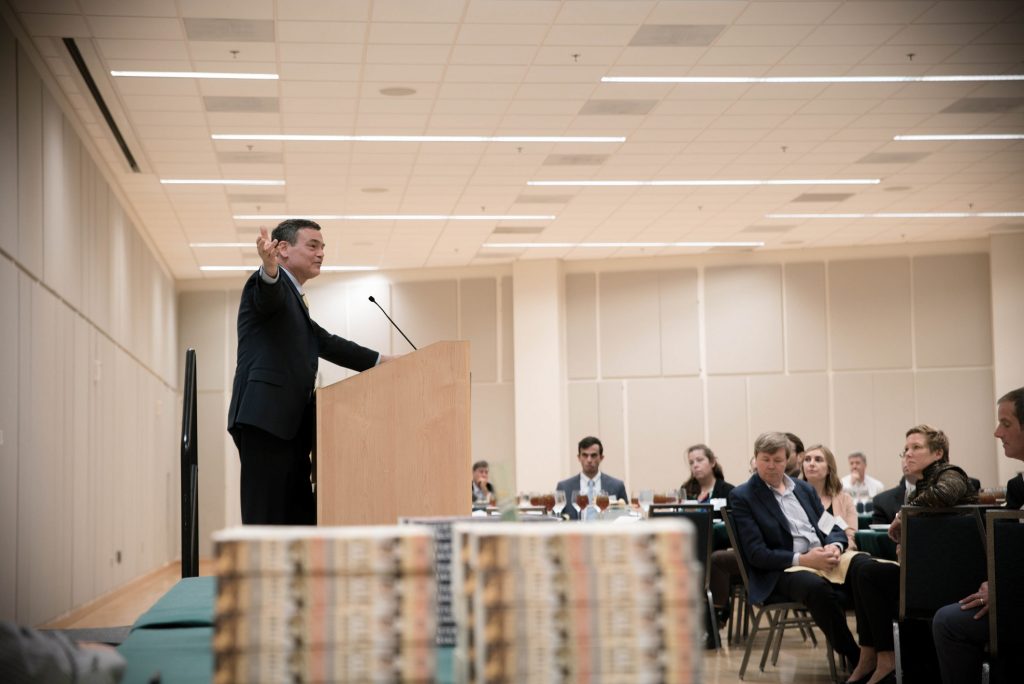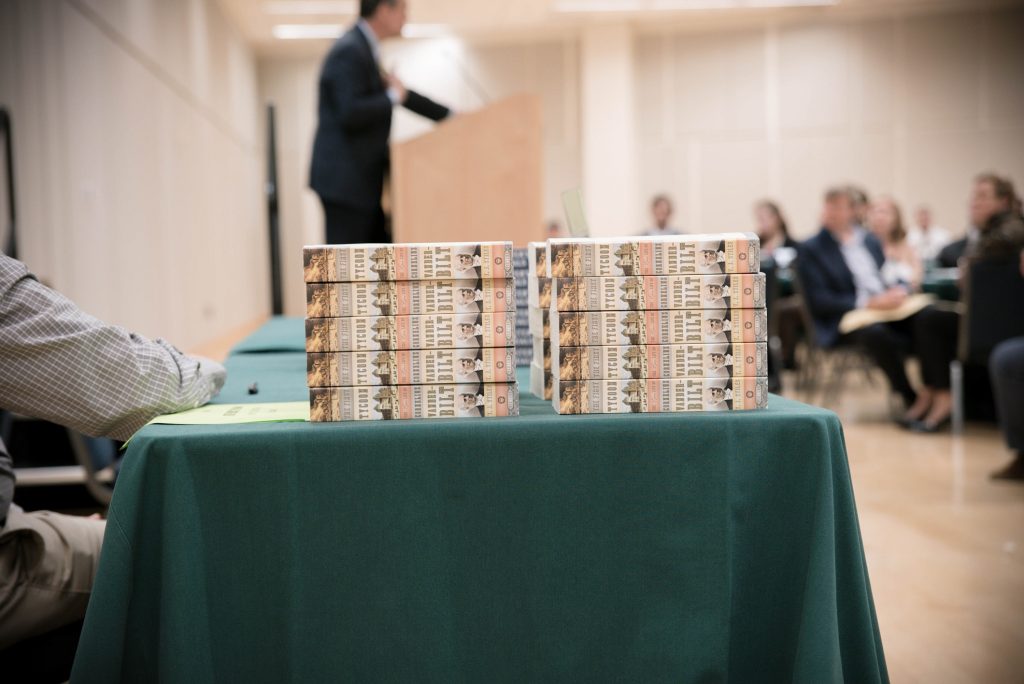 On October 12th and 13th, the Center for the Protection of Intellectual Property (CPIP) hosted its Fifth Annual Fall Conference at Antonin Scalia Law School in Arlington, Virginia. The event brought together scholars, industry professionals, and practicing attorneys to discuss recent developments in intellectual property law and to present meaningful policy reform proposals. In addition to panels and presentations of recent scholarship in IP, the conference featured a keynote address by the Pulitzer Prize-winning author and copyright advocate T.J. Stiles in which he discussed his career in writing and made an inspiring case for the rights of creators.
On October 12th and 13th, the Center for the Protection of Intellectual Property (CPIP) hosted its Fifth Annual Fall Conference at Antonin Scalia Law School in Arlington, Virginia. The event brought together scholars, industry professionals, and practicing attorneys to discuss recent developments in intellectual property law and to present meaningful policy reform proposals. In addition to panels and presentations of recent scholarship in IP, the conference featured a keynote address by the Pulitzer Prize-winning author and copyright advocate T.J. Stiles in which he discussed his career in writing and made an inspiring case for the rights of creators.
Watch the keynote here:
Stiles, whose works include the award-winning biographies Custer’s Trials: A Life on the Frontier of a New America and The First Tycoon: The Epic Life of Cornelius Vanderbilt, began his speech by detailing his various book projects over the course of his career and explaining how he writes about topics that personally interest and compel him—stories which others authors sometimes overlook. He also made clear from the start that though he writes for creative fulfillment, writing books is his job, and he relies on the money they make to live.
 Speaking on the distinctions between academic and commercial publishing, Stiles explained that he relies on book sales to expand his audience. He noted that, as a biographer, his books are a unique combination of fact-filled scholarship and non-fiction, artistic prose. It’s a genre of writing that has a broad market, but one with a dwindling number of authors due to diminishing incentives.
Speaking on the distinctions between academic and commercial publishing, Stiles explained that he relies on book sales to expand his audience. He noted that, as a biographer, his books are a unique combination of fact-filled scholarship and non-fiction, artistic prose. It’s a genre of writing that has a broad market, but one with a dwindling number of authors due to diminishing incentives.
Providing a stark overview of the state of the writing profession, Stiles pointed out that the number of full-time authors is down 30% from 2009, and that annual income for full-time authors has dropped from $25,000 to $17,500. Freelance journalist income has fallen from between $1 and $4 a word to between 25 cents and $1.25. Moreover, Stiles explained that, as an author, he is his own employee, and that he is responsible for costs that others may take for granted:
Meanwhile, while we’re struggling with these constraints on income, I’m paying my own health insurance, I am saving for retirement on my own. There is no matching contribution to a retirement fund, and I’m paying self-employment tax.
He also pointed out that, depending on the stage of a book project, his income can vary wildly. While some years his expenses and taxes can be covered by book proceeds and publishing partnerships, other years bring burdensome costs. And though the small royalty streams from his older books may seem to some insignificant, Stiles explained that they are used to cover his mortgage, car payments, and health insurance for a family of four.
Stiles spoke to the importance of controlling the rights in one’s work, noting that sometimes overlooked rights such as the right to perform (as it relates to the recording of audio books) can generate important licensing income. In addition to the costs of living he detailed earlier in his speech, this income is reinvested directly into his current or future projects by paying for research trips and other expenses.
Addressing rampant piracy in the digital age, Stiles noted that though illegal downloading doesn’t affect books as much as music and movies, the unauthorized copying and digitization of books through massive internet archiving projects is devaluing works of authorship and threatening the creative marketplace.
Stiles lamented that in addition to losing money from theft and misappropriation, creators are expected to police the Internet for infringement and enforce their rights on a case-by-case basis, a task that is virtually impossible. Stiles then compared this unrealistic expectation to a scenario in which a shopkeeper is expected to track down and arrest shoplifters, making a persuasive point about the absurdity of private copyright policing.
 Stiles warned that when authors lose control of their works, it chips away at the incentives that drive independent creation, thereby silencing important voices. This disregard for the rights of creators is part of a larger problem: the degradation of a social compact and understanding that we should pay for something that we want. It’s a troubling trend that could have disastrous consequences in an age when stolen content is available at the click of a mouse.
Stiles warned that when authors lose control of their works, it chips away at the incentives that drive independent creation, thereby silencing important voices. This disregard for the rights of creators is part of a larger problem: the degradation of a social compact and understanding that we should pay for something that we want. It’s a troubling trend that could have disastrous consequences in an age when stolen content is available at the click of a mouse.
Cautioning against the embrace of certain large tech companies, Stiles explained that when digital platforms aggregate and distribute huge amounts of content, creators are separated from the income their works are generating. Platforms such as YouTube want to compile as much content as possible, pay as little as possible for it, and then turn a profit by inundating said content with advertisements. Stiles warned that this behavior skews price expectations and ultimately disincentivizes creators.
In closing, Stiles reiterated just how important copyright and creative control is to fostering individual voices:
I think it’s absolutely essential for our culture, for our knowledge, for just the sheer pleasure of living, to maintain these individual voices. But again, it’s our very individuality, our very disaggregation which provides our cultural value, which it also is the limiting factor on the economic, the financial value we get out of our work.
Though it may seem like an obvious construct, the fact that artists and creators rely on the income generated by their works to live is something that is all too often discounted in an era of endless content, and it’s one that needs repeating. T.J. Stiles’ story is one of success in writing, but it’s also a cautionary tale that shows how even acclaimed authors rely on copyright and control of their works to get by. Continuing to incentivize authors and creators and allowing them to make a living is more important now than ever before, and for T.J. Stiles, “that’s what copyright is all about.”